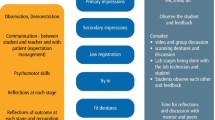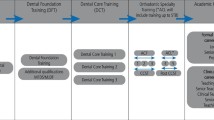Key Points
-
Outlines the scope of restorative dentistry as a specialty
-
Will help practitioners understand the workings of hospital departments and provides career guidance
-
Aids dialogue between specialists and those in primary care
Abstract
A recent national survey has shown the need for clarification regarding the various disciplines encompassed by restorative dentistry and their respective training pathways. This document aims to address this by outlining the remit of restorative dentistry, in addition to the various job roles involved. This information is being disseminated by the British Society for Restorative Dentistry, and given the relevance to referrers and those looking for insight into the speciality, it has been reproduced here. Roles within the speciality range from dentists with special interests to specialists and consultants, whether primarily academic or clinical. The choice that a new graduate may make to choose a specific route will likely depend on a number of factors, often specific to each individual. Guidance on ways to gain experience and sources of further information are also provided.
Similar content being viewed by others
Introduction
This document aims to give the new graduate an insight into the speciality of restorative dentistry. A recent survey has shown that confusion is common regarding the speciality and the training pathways within it. A variety of career pathways lie within the speciality and it is an enormously rewarding field to work in, with a wide variety of intensely stimulating clinical and non-clinical facets to be experienced on a daily basis. Specialists in the field may find that they are rehabilitating patients with major oro-facial defects, training dentists, leading a varied team and carrying out groundbreaking research all in one day.
What is restorative dentistry?
Restorative dentistry is the study, examination and treatment of diseases of the oral cavity, the teeth and their supporting structures. Restorative dentistry includes the dental monospecialties of endodontics, periodontics and prosthodontics (including implantology), and its foundation is based upon how these interact in the management of cases requiring multifaceted care. Figures 1, 2, 3, 4, 5, 6 show cases highlighting the clinical breadth of restorative dentistry.
What are the different roles?
Dentists with special interests
Dentists with special interests are those who have further experience in an aspect of restorative dentistry but not to a specialist level. This experience is often achieved via further postgraduate training. They may have undertaken a diploma or Master of Science (MSc) qualification, for example in endodontics or restorative dental practice. These courses are usually self-funded and associated with a university. They may be full-time or part time and vary greatly in their content and structure from online correspondence to full time courses with clinical supervision in a specialist setting.
These dentists usually work in primary care and may be able to accept some referrals. They may also work as staff grades in hospital. These dentists will provide an aspect of restorative dentistry to a level above that of a new graduate, for example they may be competent to place and restore implants. They may be involved with training undergraduates. Further information on the programmes available can be found on dental school websites.
Specialists in endodontics, periodontics and prosthodontics
Specialists are experts within their fields, usually one of endodontics, periodontics or prosthodontics (known as the restorative monospecialties). Specialists usually work in private practice, providing care within that specific discipline. They often accept referrals to provide specialist care. Specialists may carry out teaching independently and they may also work in hospitals as staff grades or speciality doctors providing treatment and/or training for undergraduates or postgraduates.
Specialists usually need to have successfully completed a three-year full-time training programme, usually a Master of Clinical Dentistry (MClinDent). The vast majority of the programmes are self-funded and entry is competitive, usually involving an application and interview. Many programmes have the option of part-time training over four to five years which allows students to work part-time in order to manage their costs. Further information on the programmes available can be found on dental school websites.
To be recognised as a specialist by the General Dental Council the postgraduate would need to pass a membership exam through one of the Royal Colleges (England, Edinburgh, Glasgow or Dublin). Mediated entry to the specialist list by assessment of CV and qualification is usually limited to candidates who have studied or worked abroad.
Consultants in restorative dentistry
Consultants in restorative dentistry have undergone five year full-time funded training and then are expected to work at least part-time in hospitals providing complex care to patients. This includes multi-disciplinary care in liaison with other specialists, surgeons and physicians, for example the management of hypodontia cases with orthodontists or planning the extraction and replacement of teeth in cancer patients with surgeons. These cases provide unique challenges that can be very rewarding to overcome. Consultants in district general hospitals would be expected to provide a specialist level of care across all three specialties. They also provide an advice and treatment planning service for local practitioners through consultant clinics.
In teaching hospitals consultants may also be involved in carrying out and overseeing research; more emphasis is placed on this aspect in academic posts, primarily aimed at people who have additionally undertaken a PhD. Consultants will be heavily involved with leading a team of staff and overseeing clinical governance in addition to teaching. In most circumstances the consultant will primarily be based in one of the restorative disciplines.
The job roles can vary considerably depending on where the consultant is based and the needs of that department at the time. Gaining a training (speciality trainee registrar [StR]) post is competitive and candidates need to show hospital experience (usually dental core trainee posts) and the initiative to undertake audits, research and teaching. Posts become available annually and recruitment has recently become national.
Dental core trainee, speciality registrar and consultant pay scales are available on the Department of Health website; these are set nationally and currently trainees in London receive around £2,000 more per annum due to the increased living costs associated with the area. Further information can be found on the National Restorative Dentistry Recruitment website.
University careers in restorative dentistry
Professors in restorative dentistry have undertaken a Doctor of Philosophy (PhD) research project and may have had experience as lecturers and senior lecturers. The focus for these posts is primarily teaching and research, however they do also carry out clinical work. They are likely to be involved with national and international projects.
Candidates for these posts have often undertaken a seven year academic clinical fellow post which involves clinical training in addition to a research project, usually a PhD. Gaining these training posts is also via competitive entry.
What is a restorative department?
Understanding the workings of restorative dentistry departments is helpful for those considering a career within the speciality in addition to aiding practitioners who may refer patients in. Restorative departments vary considerably in their size and scope. They all, however, share common clinical priorities and the extent to which they can provide treatment to lower priority cases will depend on their capacity. Larger departments in teaching hospitals with more trainees are more likely to be able to take on less complex cases for treatment, depending on their capacity and training needs at the time. District general hospitals have limited capacity to accept referrals from primary care. As is the case across the NHS, there is a limited amount of funding that goes into these departments and hence it is most likely to be restricted to the most complex cases.
The clinical priority for these departments is to provide treatment to rehabilitate the oral cavity, particularly in cases requiring multi-disciplinary treatment in order to restore function or those cases where the medical history precludes treatment in primary care. Examples include providing prostheses to cancer patients with considerable oral or facial defects following surgical management of a tumour. Patients with active primary disease, for example those with caries or active periodontitis and poor oral hygiene are low priorities for treatment in these departments.
Restorative dentistry departments will also have advice and treatment planning services where practitioners can refer patients in for assessment by a consultant and construction of a treatment plan to be carried out by the referring practitioner.
These departments are likely to undertake research on the effective management of these cases in addition to teaching, if trainees are present. Please check the website of your local restorative dentistry department for further information.
Next steps for a restorative career
The box provides further reading on the options and remit within the speciality. Accessing dental school websites will provide further information about the various courses available. While you are considering career options, short courses run by universities and postgraduate dental deaneries can provide further experience and knowledge in addition to providing contact with more experienced clinicians to gain further insight. Contacting specialists, potentially via your foundation training scheme, can help you to understand what the different roles involve. Attending speciality society meetings and conferences are an excellent way to gain understanding of a potential career. The British Dental Association also runs a Careers Day which can prove useful.
If you are interested in a career within restorative dentistry, arguably the best way to gain further experience to help career planning and develop skills that are transferable to primary care and other specialties is to work as a dental core trainee (DCT) in a restorative dentistry department. These posts will normally run for one to two years at one or more dental hospitals. The posts usually involve supervised diagnosis and treatment planning of new patients, treatment provision on healthy patients requiring slightly complex work, as well as routine treatment for medically compromised patients. The posts can help prepare for the MFDS or MJDF examinations, improve theoretical knowledge in restorative dentistry and aid understanding of applying evidence-based dentistry. DCT posts primarily involve clinical experience, which is underpinned by academic support. The posts are advertised and recruited through post-graduate dental deaneries and further information is available via the UK Committee of Postgraduate Dental Deans and Directors Website (www.copdend.org).
Author information
Authors and Affiliations
Corresponding author
Additional information
Refereed Paper
Rights and permissions
About this article
Cite this article
Kalsi, A., Lewis, N. & Hemmings, K. Information regarding restorative dentistry for new graduates. Br Dent J 221, 426–428 (2016). https://doi.org/10.1038/sj.bdj.2016.736
Accepted:
Published:
Issue Date:
DOI: https://doi.org/10.1038/sj.bdj.2016.736
This article is cited by
-
New UK graduates' knowledge of training and service provision within restorative dentistry – a survey
British Dental Journal (2017)









